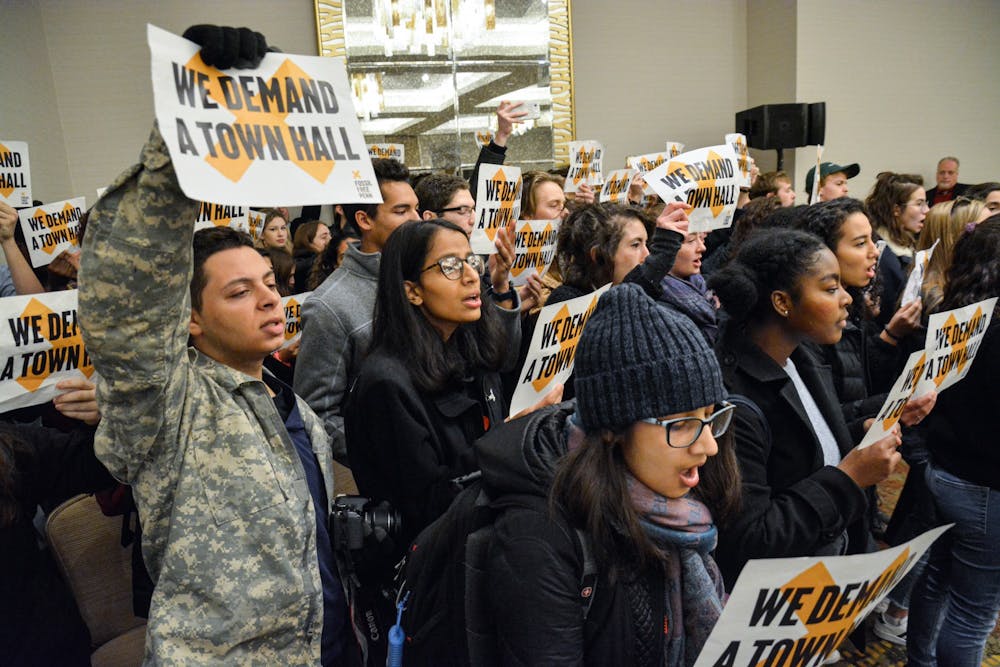This Earth Day, Penn’s leaders will likely proclaim how committed our university is to making progress on environmental issues, including the climate emergency. However, the failure of Penn’s Board of Trustees to seriously address climate divestment undermines this posture and is antithetical to Penn’s mission of nurturing future leadership and cultivating global stewardship.
Penn is now a laggard rather than a leader on the climate crisis. Many of our peer universities have announced policies fully divesting from companies producing oil and other fossil fuels which, when burned, emit massive quantities of the greenhouse gases causing global heating. The list includes Brown, Cornell, Georgetown, the University of California system, the University of Massachusetts system, and the University of Michigan.
Given these precedents, what explains Penn’s recalcitrance? We suggest that implicit if not explicit conflicts of interest within Penn’s Board of Trustees may be a contributing factor.
Consider, for example, that Scott Bok, the incoming chair of the Board of Trustees, is a career financier who is currently the CEO of an investment bank that advises and profits from many companies heavily involved in oil and gas extraction and sales. Similarly, other long-time trustees have significant material incentives to prolong the fossil fuel industry’s death grip on our climate in their banking and financing businesses. Have these trustees recused themselves from any considerations about divestment? Do other trustees counterbalance these business interests and related values? We don’t know; maybe none do. Unlike at Cornell, Penn’s Board of Trustees includes no student representative.
Faculty members have been similarly kept in the dark with respect to the Board of Trustees’ actions. For example, the Board of Trustees’ most recent non-action on divestment was made public only a few hours before a scheduled meeting organized by the Faculty Senate Executive Committee to discuss climate issues. At this event, each of us asked separate specific questions about the divestment policy in the chat, and despite being the most upvoted questions, both of our questions were ignored by Penn’s chief investment officer and other top administrators.
We do not question the integrity of any of the trustees, but we raise a question about possible bias, and their collective judgment is surely wanting.
The Board of Trustees’ own statement on divestment says that Penn would divest from companies that represent “a moral evil implicating a core University value that is creating a substantial social injury.” Yet what greater moral evil can be imagined than continued production and burning of fossil fuels at a rate that scientists predict will disrupt the global climate with the anticipated consequences of hundreds of millions of deaths by 2100 and exacerbated social inequities? The Board of Trustees says there must be “a specific company or companies identified for divestment.” Yet we know that only 20 firms have contributed approximately 35% of all greenhouse emissions since 1965, and most if not all continue along at the same or accelerated pace.
This Earth Day in 2021 is a sad one at Penn because our Board of Trustees continues to fail in its true fiduciary duty to invest responsibly for our long-term sustainable future. Penn’s recently announced divestment strategy is instead indistinguishable from the greenwashing of leading fossil fuel companies like BP and Shell which pledge that they too will be carbon neutral by 2050.
Aligning more with Big Oil than the research and teaching in our own university shows how far our trustees are falling short. By refusing to act in accordance with the urgency of the climate crisis, the trustees are choosing to lag rather than lead, thus positioning Penn as a complicit partner in the propagation of climate injustice. Leadership requires a strong belief in science and the courage to act on it.
We urge those trustees who are not biased by their conflicts of interest to find the courage to help us all to prevent climate catastrophe. We urge everyone in the wider Penn community — including students, faculty, staff, and alumni — to act to persuade our trustees to do the right thing and fully divest now.
VYSHNAVI KOSIGISHROFF is a College junior studying economics and environmental studies. She is also co-chair of the Student Sustainability Association at Penn. ERIC ORTS is the Guardsmark Professor of Legal Studies at the Wharton School. He is also a member of the Faculty Senate’s Committee for an Institutional Response to the Climate Emergency. Their emails are vkosigi@sas.upenn.edu and ortse@wharton.upenn.edu, respectively.









